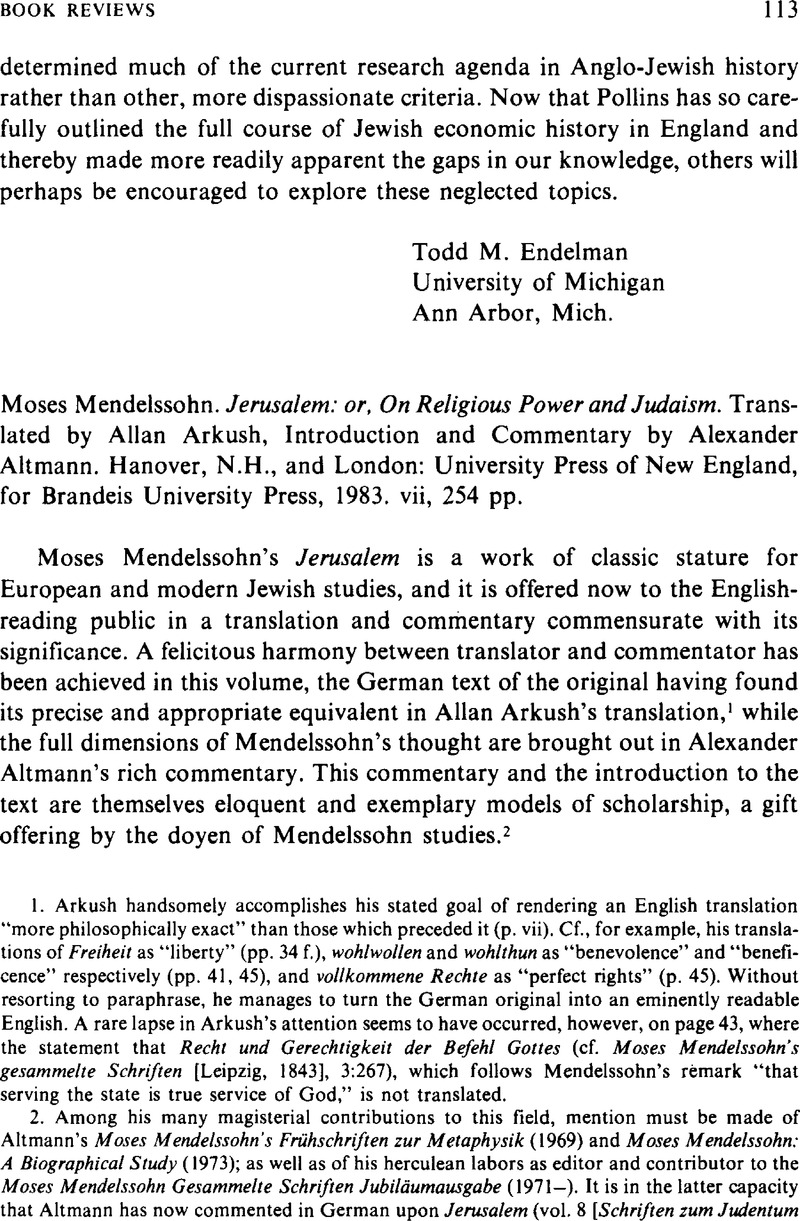Article contents
Moses Mendelssohn. Jerusalem: or, On Religious Power and Judaism. Translated by Allan Arkush, Introduction and Commentary by Alexander Altmann. Hanover, N.H., and London: University Press of New England, for Brandeis University Press, 1983. vii, 254 pp.
Published online by Cambridge University Press: 15 October 2009
Abstract

- Type
- Book Reviews
- Information
- Copyright
- Copyright © Association for Jewish Studies 1986
References
1. Arkush handsomely accomplishes his stated goal of rendering an English translation “more philosophically exact” than those which preceded it (p. vii). Cf., for example, his translations of Freiheit as “liberty” (pp. 34 f.), wohlwollen and wohlthun as “benevolence” and “beneficence” respectively (pp. 41, 45), and vollkommene Rechte as “perfect rights” (p. 45). Without resorting to paraphrase, he manages to turn the German original into an eminently readable English. A rare lapse in Arkush's attention seems to have occurred, however, on page 43, where the statement that Recht und Gerechtigkeit der Befehl Gottes (cf. Moses Mendelssohn's gesammelte Schriften [Leipzig, 1843], 3:267), which follows Mendelssohn's remark “that serving the state is true service of God,” is not translated.
2. Among his many magisterial contributions to this field, mention must be made of Altmann's Moses Mendelssohn's Frühschriften zur Metaphysik (1969) and Moses Mendelssohn: A Biographical Study (1973); as well as of his herculean labors as editor and contributor to the Moses Mendelssohn Gesammelte Schriften Jubiläumausgabe (1971–). It is in the latter capacity that Altmann has now commented in German upon Jerusalem (vol. 8 [Schriften zum Judentum II], Stuttgart—Bad Cannstatt, 1983), the commentary before us representing, as he tells us on page 29 of the introduction, a “revised and abridged version” of the German work.
3. However rich the rewards which await the reader of these notes, his task has not, I am afraid, been facilitated by the manner in which the notes have been keyed to the text, referring as they do to lines which are not explicitly numbered.
4. Cf. the present translation and commentary, pp. 21 ff., 158 ff., 230.
5. Ibid., pp. 173 ff., 206 ff.
6. Ibid., pp. 16 ff., 173, 186.
7. Ibid., pp. 13–25. For all his sympathy with Mendelssohn, Altmann does not turn a blind eye to the liberties he took in presenting certain traditional Jewish positions. Cf., for example, pp. 16, 20, 184, and 232.
8. Ibid., pp. 41 ff., 166 ff. I do not mean to imply by this that Mendelssohn's notion of “benevolence” as intrinsic to man's nature is necessarily repudiated, however battered historically it may be for us. As social beings, perhaps we must continue to affirm it, if on grounds other than Mendelssohn's. However, we do not similarly have to endorse his views concerning the altruistic nature of political institutions per se, or his idealization of the state.
9. Ibid., pp. 90 ff., 127 ff. Though crucial for his view of Judaism as a “revealed legislation,” Mendelssohn's attitude to history is actually ambivalent, as Altmann shows, pp. 17 f. Mendelssohn's political philosophy is predicated upon the reality, even desirability, of a depoliticized Judaism, i.e., of the state of affairs which presumably followed the falling away from the original “authentic” period of the faith, that in which the “Mosaic constitution” was the sole law of the land, and God himself the king.
10. Cf, for example, Mendelssohn's analysis of the rabbinic attitude to prescribing punishments for violation of the Halakhah, ibid., p. 130; and see Altmann's comments, p. 232.
11. Ibid., introduction, p. 16.
12. Ibid., pp. 95 f.
- 1
- Cited by




